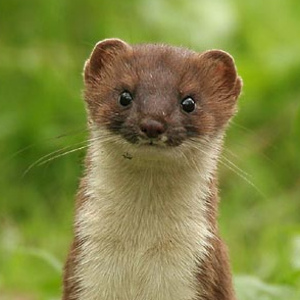Weasels
« previous post | next post »
 According to Merriam-Webster, a weasel is
According to Merriam-Webster, a weasel is
: a small animal that has a thin body and brown fur and that eats small birds and other animals
: a dishonest person who cannot be trusted
It's the second sense — and the alliteration with winner — that leads a local sports talk radio show to offer "winner of the week and weasel of the week" pseudo-awards. The Watcher of Weasels web site similarly has a "weasel of the week" award:
Every Tuesday, the Council nominates some of the slimiest, most despicable characters in public life for some deed of evil, cowardice or corruption they’ve performed. Then we vote to single out one particular Weasel for special mention, to whom we award the statuette of shame, our special, 100% plastic Golden Weasel.
But a couple of days ago, I saw something in the Daily Pennsylvanian that made me wonder whether there's some semantic bleaching going on, washing out the implications of dishonesty, evil, cowardice, and corruption, and thereby leaving weasel as nothing more than mildly derogatory epithet.
The DP has a regular feature "Guess Their Favorites", in which a pair of students are asked to guess various of one another's preferences. Last Thursday's edition featured a couple of swimmers, who among others things were asked about their "least favorite coach phrase":
Their answers:
Ellie: Weasel [Coach Mike Schnur] calls both us [sic] weasels every single day.
Maddie: Slow weasel.
Ellie: Fat weasel…
Maddie: Yeah
Ellie: Mostly fat and slow weasel.


Victor Mair said,
November 15, 2015 @ 3:04 pm
What I want to know is how weasels got such a bum rap / rep in the first place?
And what about "weasel words"?
Sili said,
November 15, 2015 @ 3:18 pm
Before or after Wind in the Willows?
Victor Mair said,
November 15, 2015 @ 3:27 pm
Whenever.
DCBob said,
November 15, 2015 @ 3:43 pm
I think 'weasel' as a mild derogatory has been around for decades, especially as nickname for a person with a thin face and long nose. An example close to home is Jonathan 'Weasel' Gilbert, DJ for the old favorite of Washington DC alt rockers of the 1970s, WHFS (and now at WTMD in Towson).
Jerry Friedman said,
November 15, 2015 @ 4:14 pm
The OED says, "It is remarkable for its slender body, and for its ferocity and bloodthirstiness."
It cites"
"transf. and fig.
1600 Shakespeare Henry V i. ii. 170 For once the Eagle, England being in pray, To his vnfurnish nest the weazel Scot Would suck her egs.
a1637 B. Jonson Tale of Tub i. vi. 14 in Wks. (1640) III Wherefore did I, Sir, bid him Be call'd, you Weazell, Vermin of an Huisher?
1638 J. Ford Fancies ii. 27 Whoreson lecherous weezill?
1639 J. Shirley Ball i. sig. A4, Co. Dee not know him, tis the Court dancing Weesill. Ma. A Dancer, and so gay.
1790 J. Wolcot Advice to Future Laureat ii. 39 Brudenell, thou stinkest! weasel, polecat, fly!
1886 P. Robinson Valley Teetotum Trees 39 A thin little weasel of a Bengalee Baboo."
Margaret Dean said,
November 15, 2015 @ 4:17 pm
I suspect weasels got tarred with the same brush as any other animal that might prey on game birds (or their nests and young), leaving aristocrats fewer to blow away with shotguns … and which wasn't any fun to hunt with packs of dogs, either.
CL Thornett said,
November 15, 2015 @ 5:08 pm
Weasels have long had a reputation for 'sneaking' through small unnoticed holes to attack poultry and take eggs. This would have made them very unpopular with a population relying on poultry and their eggs as significant sources of protein, so the metaphoric senses are not surprising.
Weasel predation of domestic poultry is much older than shotguns, and the loss of eggs and chicks would be a bigger blow to the poor than to the wealthy. Even now small-holders can become, um, eloquent on the subject of predators and poultry.
Victor Mair said,
November 15, 2015 @ 5:23 pm
I thought that their bad reputation may have come from their habit of sucking eggs, and it seems that the the expression "weasel word" may have the same derivation.
Rubrick said,
November 15, 2015 @ 7:03 pm
An otter is basically a "fat weasel". Any swimmer accused of being an otter should take it as a compliment. ;-)
Ginger Yellow said,
November 16, 2015 @ 5:06 am
Nine comments and nothing on the serendipitous "Ellie: Weasel"? I'm disappointed.
richardelguru said,
November 16, 2015 @ 8:58 am
Then there's Alison:
"Fair was this yonge wyf, and therwithal/As any wezele hir body gent and smal."…
AM Thomson said,
November 16, 2015 @ 9:55 am
………. and there's the verb, to weasel [out].
Homer Simpson: "Weaselling out of things is what separates us from the animals. Except weasels."
MD said,
November 16, 2015 @ 11:22 am
My guess is that "Weasel" in this context is maybe being used as an allusion to the non-swimming relative of the otter and the mink (both swimmers).
When running cross-country as a kid, we would be chided as "cattle" or "cows" when running in a slow bunch, and "gazelles" and "bocks" when running properly ahead.
Coby Lubliner said,
November 16, 2015 @ 11:30 am
I wonder if the derogatory use of "weasel" is limited to English, since Wiesel is a not uncommon German surname, and I am not aware of belette, comadreja and the like being used in a derogatory way.
hector said,
November 16, 2015 @ 3:03 pm
I second CL Thornett.
Basically, "because most people used to be peasants."
Jeroen Mostert said,
November 16, 2015 @ 4:34 pm
@Coby Lubliner: at least in Dutch, there's the expression "bange wezel" ("fearful weasel"): a scaredy cat, since weasels (like most small animals with prudence) are quick to skedaddle when confronted. That said, "angsthaas" ("anxious hare") is far more common. This is probably only dipping into the vast zoo of apprehensive critters that have entered the idioms of various languages.
In Dutch you wouldn't call someone a weasel to accuse them of underhandedness; you'd call them a dirty rat (as you might in English).
J. W. Brewer said,
November 16, 2015 @ 6:12 pm
The generally pejorative sense of "weasel" in AmEng seems sufficiently well-established that I would want more evidence than a usage that might be distinctive to a single college swim coach to conclude that a bleaching trend is underway.
chris said,
November 16, 2015 @ 7:24 pm
weasels (like most small animals with prudence) are quick to skedaddle when confronted
Isn't it remarkable how many of the animals we consider cowardly (in various languages) are ones that we outweigh by a factor of 10 or more? Of course interacting with *us* makes them nervous, the same way lots of people are nervous around bulls (never mind elephants).
I tend to agree with the predation-on-domestic-animals explanation for how weasels got their bad rap; it worked for wolves. Weasels, being smaller, are cleverer at getting into spaces you thought you had kept them out of, hence their verb.
Sean Bentley said,
November 16, 2015 @ 7:39 pm
Well, I had high hopes for the Watcher of Weasels site. Very sorry to see it is primarily a venue for reactionary propaganda.
Alon Lischinsky said,
November 18, 2015 @ 9:16 am
@Cory Lubliner: comadreja is not common as an insult, but it's attested, e.g.: “En otra mesa, el doctor Aschero y el joyero-relojero Roig: un hijo de puta con aliento a perro y una comadreja chupamedias, pensó Juan Carlos.” (Puig, Manuel. 1994/1972. Boquitas Pintadas. Barcelona: Seix Barral). It may be a Rioplatense thing, though.